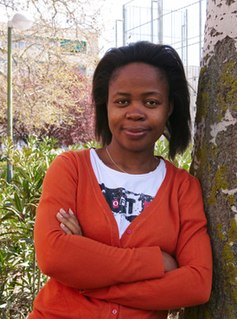Related Research Articles

María Nsué Angüe was a noted Equatoguinean writer and Minister of Education and Culture.

Donato Francisco Ndongo-Bidyogo Makina, known as Donato Ndongo, is an Equatoguinean journalist and writer who was one of most prominent members of Hispanic African movement within the Spanish-speaking world.

Equatorial Guinea was the only Spanish colony in Sub-Saharan Africa. During its colonial history between 1778 and 1968, it developed a tradition of literature in Spanish, unique among the countries in Africa, that persists until the present day.

Jade Boho Sayo, simply known as Jade, is a Spanish-born Equatorial Guinean footballer who plays as a forward for Swiss Women's Super League club Servette FCCF. She has been a member of the Equatorial Guinea women's national team.

Ibán Iyanga Travieso, better known as Randy, is a Spanish-born Equatorial Guinean footballer. He has been a member of the Equatorial Guinea national team. Mainly a left winger, he can also operate as a right back.
Carlos Akapo Martínez is an Equatoguinean professional footballer who plays for Spanish club Cádiz CF and the Equatorial Guinea national team as a right back or central defender.
José Antonio Miranda Boacho, known as Josete Miranda or simply Josete, is a Spanish-born Equatoguinean professional footballer who plays as a forward for Greek Super League 2 club Niki Volos, on loan from Getafe CF B, and the Equatorial Guinea national team. He can also operate as a central midfielder.

The Equatoguinean Academy of the Spanish Language is an association of academics and experts on the use of the Spanish language in Equatorial Guinea, a republic in Central Africa in which Spanish is the national official language. Equatoguinean Spanish is the particular variety of Spanish that is spoken in the country. Since 19 March 2016, it has been a member of the Association of Spanish Language Academies.
Federico Ondo Obama Ondo, also known as Fede, is an Equatoguinean professional footballer who plays as a fullback for Tercera División club CD Acero. He has been a member of the Equatorial Guinea national team. He also holds Spanish citizenship.
Saúl Basilio Coco-Bassey Oubiña, better known as Saúl Coco, is a Spanish-born Equatoguinean professional footballer who plays as a central defender or a defensive midfielder for Spanish club UD Las Palmas and the Equatorial Guinea national team.
Eugenia Bokoka Mosua, sportingly known as Anaís, is an Equatoguinean footballer who plays as a forward for Malabo Kings FC and the Equatorial Guinea women's national team.

Trifonia Melibea Obono is a novelist, political scientist, academic and LGBTQI+ activist. Her novel La Bastarda is the first novel by a female Equatorial Guinean writer to be translated into English.
Marvin José Anieboh Pallaruelo, known as Marvin in Spain, is a Spanish-born Equatorial Guinean footballer who plays as a either a central defender or a right back for Segunda División RFEF club CP Cacereño and the Equatorial Guinea national team.

Equatorial Guinea–Venezuela relations refers to international relations between the Republic of Equatorial Guinea and the Bolivarian Republic of Venezuela. In both countries the official language is Spanish and they have an important economic activity based on oil extraction.
Bruno Esono Ondo Mengue is a Spanish-born Equatoguinean professional basketball player who plays as a shooting guard and a small forward for Scandone Avellino and the Equatorial Guinea national team. He also holds Italian citizenship.
Larry Abia Sila is a Spanish-born Equatoguinean professional basketball player who plays for LEB Plata club CP La Roda and the Equatorial Guinea national team.
Gaudencio Mohaba Mesu is an Equatoguinean politician. He is the current President of the Chamber of Deputies in Equatorial Guinea.

Remei Sipi Mayo, known as Tía Remei, is a Spain-based Equatoguinean writer, editor, educator, and activist focused on gender and development.
During the afternoon of 7 March 2021, a series of four explosions occurred at a military barracks in the neighborhood of Nkoantoma, a district of Bata, the largest city and commercial capital of the Central African country of Equatorial Guinea. At least 107 people died, and more than 600 others were injured, while significant infrastructural damage also occurred throughout the city.
Raymundo Bernabé Nnandong Nchama Russo, is an Equatoguinean filmmaker, actor, producer, and screenwriter. He is best known for directing the award-winning 2020 documentary film Manoliño Nguema. He is also a member of the CEID board of directors in charge of Youth, Social Action and Communication.
References
- ↑ "Página Oficial del Gobierno de la República de Guinea Ecuatorial". www.guineaecuatorialpress.com. Retrieved 2021-10-11.
- ↑ "AFRICA in "Enciclopedia del Cinema"". www.treccani.it (in Italian). Retrieved 2021-10-08.
- ↑ "AFRICAN CINEMA SEMINARS". FCAT 2021. Retrieved 2021-10-09.
- ↑ "LEARNING SPACE". FCAT 2021. Retrieved 2021-10-09.
- ↑ "Página Oficial del Gobierno de la República de Guinea Ecuatorial". www.guineaecuatorialpress.com. Retrieved 2021-10-11.
- ↑ FEGUIBOX - Documentary by Rubén Monsuy and Gabriel Amdur , retrieved 2021-10-08
- ↑ MEDIA. "Memoria negra". MFDB - MEDIA Films Database. Retrieved 2021-10-10.
- ↑ Arencibia, Luis Roca (2016-02-08). "Aquí se rodó 'Palmeras en la nieve'". EL PAÍS (in Spanish). Retrieved 2021-10-08.
- ↑ SensaCine, Palmeras en la nieve (in Spanish), retrieved 2021-10-08
- ↑ Palmeras en la nieve (2015) (in Spanish), retrieved 2021-10-08
- ↑ Teresa (2010) (in Spanish), retrieved 2021-10-09
- ↑ Teresa , retrieved 2021-10-09
- ↑ Esono, Juan Pablo Ebang, Teresa (Short, Drama), retrieved 2021-10-09
- ↑ Orduña, Juan de (1946-10-16), Misión blanca (Drama), Colonial AJE, retrieved 2021-10-09
- ↑ "El escritor de un país sin librerías". Rizoma (in Spanish). Retrieved 2021-10-11.
- ↑ "Paralelas - El escritor de un país sin librerías'". Festival l\'ALternativa (in Spanish). Retrieved 2021-10-11.
- ↑ "El sisè Festival Gollut de Ribes premia un documental sobre la colonització espanyola a Guinea". el9nou.cat. Retrieved 2021-10-11.
- ↑ "The Writer From a Country Without Bookstores". elescritordeunpais.com. Retrieved 2021-10-10.
- ↑ Anomalías eléctricas (2010) - IMDb , retrieved 2021-10-09
- ↑ Anomalias Electricas. Taller de Animación I Festival de Cine Africano de Guinea Ecuatorial 2010 , retrieved 2021-10-09
- ↑ Marfil (2011) - IMDb , retrieved 2021-10-09
- ↑ MARFIL , retrieved 2021-10-09